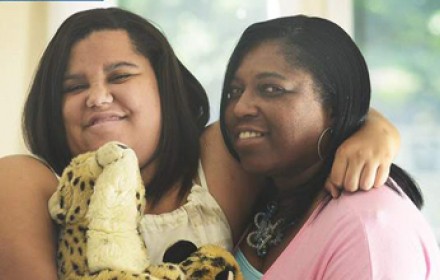Marriage & Family Therapy Grad Motivated to Help Families with Special Needs

A Spartanburg teacher credits raising her autistic niece as motivation for wanting to do more to help the families of children with special needs. Beverly Wade has worked as a special education teacher for more than 20 years. She went back to college to study the impact of family dynamics on child development and will graduate with a master’s degree in marriage and family therapy from Converse College on Saturday.
“If your child has special needs, you have special needs as well.”
Wade already has a master’s degree in special education, and she will use the second master’s degree in her new job as a teacher at E.P. Todd Elementary this school year. “With marriage and family therapy, I could get further into family dynamics. Those dynamics play a huge role in development,” she said.
Wade said support systems are vitally important for families with special needs children. She said her newest master’s degree is the perfect way to combine the educational field with family development. “If your child has special needs, you have special needs as well,” Wade said. “It presents a whole set of challenges. A trip to the grocery store can be a huge, anxiety-producing event. Those support systems are very important.”
Wade also will use her experience of raising her niece to help with her work. She raised her niece, Tyler, and her brother, Devin, after her family decided the siblings needed a stable home. Wade said the decision to raise the children was the best decision her family has ever made. “I always knew I wanted to teach, but around 7 or 8 years old, I knew I wanted to work with people with disabilities,” she said. “I grew up in a family of helpers.”
“Her communication was always a struggle. Her communication struggles actually helped me with students in the classroom.”
Wade had been teaching for only a year when Tyler, 21, was born. Wade said before Tyler was diagnosed with autism, the family knew something was different about her. She would sleep peacefully through the night and rarely misbehaved. “No child is that perfect,” Wade said. “There was something different. She was just content with everything.”
When Tyler was 3, Wade was given a book about autism by Tyler’s preschool teacher. After reading it, Wade thought it all sounded familiar. “It sounded a lot like Tyler,” she said. “Her communication was always a struggle. Her communication struggles actually helped me with students in the classroom.”
Wade made the decision to get her first master’s degree, so she could stay abreast of developments in special education. “Things change so quickly, and I wanted to be able to keep up,” she said. Special education teachers need to get to know students before they can effectively educate them, Wade said. There are a variety of academic levels contained under the special education umbrella, making the need for individualized education more important. “No two children are alike,” she said. “You have to meet each kid where he or she is. It has to be very individualized.”
Last May, Wade started the process for her second master’s degree. The second master’s degree was much more difficult, Wade said. The marriage and family therapy required 500 client-contact hours, with Wade serving as a therapist while also teaching full time. Most of her days would start at 7 a.m., and she wouldn’t usually get home until about 10 p.m. “It was the hardest thing I’ve ever done,” she said.
“No two children are alike. You have to meet each kid where he or she is. It has to be very individualized.”
Wade’s work isn’t totally complete, however. She still has to pass an exam to get her license by logging another 1,350 client-contact hours in the next two years. Thankfully, she said, hours she spends teaching this year at E.P. Todd will count toward that goal. She said the time crunch won’t be as severe, since she will have two years to complete her hours instead of just one.
Once she is licensed, Wade hopes to work with people suffering from hoarding disorders and parents expecting special needs children. “I’m interested in the mental and physical aspects of being tied to an object,” she said. “I also want to work with expecting parents, and to help them build the framework and support systems they’ll need.”
This story was written by Zach Fox of the Spartanburg Herald-Journal. Photo credit: Alex Hicks